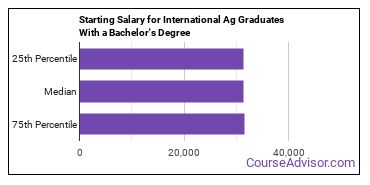International Agriculture
Featured schools near , edit
Types of Degrees International Agriculture Majors Are Getting
The following table lists how many international agriculture graduations there were in 2020-2021 for each degree level.
| Education Level | Number of Grads |
|---|---|
| Bachelor’s Degree | 74 |
| Master’s Degree | 46 |
| Basic Certificate | 2 |
What International Agriculture Majors Need to Know
People with careers related to international ag were asked what knowledge areas, skills, and abilities were important for their jobs. They weighted these areas on a scale of 1 to 5 with 5 being the highest.
Knowledge Areas for International Ag Majors
According to O*NET survey takers, a major in international ag should prepare you for careers in which you will need to be knowledgeable in the following areas:

- Biology - Knowledge of plant and animal organisms, their tissues, cells, functions, interdependencies, and interactions with each other and the environment.
- English Language - Knowledge of the structure and content of the English language including the meaning and spelling of words, rules of composition, and grammar.
- Food Production - Knowledge of techniques and equipment for planting, growing, and harvesting food products (both plant and animal) for consumption, including storage/handling techniques.
- Chemistry - Knowledge of the chemical composition, structure, and properties of substances and of the chemical processes and transformations that they undergo. This includes uses of chemicals and their interactions, danger signs, production techniques, and disposal methods.
- Production and Processing - Knowledge of raw materials, production processes, quality control, costs, and other techniques for maximizing the effective manufacture and distribution of goods.
Skills for International Ag Majors
international ag majors are found most commonly in careers in which the following skills are important:

- Reading Comprehension - Understanding written sentences and paragraphs in work related documents.
- Active Listening - Giving full attention to what other people are saying, taking time to understand the points being made, asking questions as appropriate, and not interrupting at inappropriate times.
- Writing - Communicating effectively in writing as appropriate for the needs of the audience.
- Speaking - Talking to others to convey information effectively.
- Critical Thinking - Using logic and reasoning to identify the strengths and weaknesses of alternative solutions, conclusions or approaches to problems.
Abilities for International Ag Majors
As you progress with your international ag degree, there are several abilities you should pick up that will help you in whatever related career you choose. These abilities include:

- Oral Expression - The ability to communicate information and ideas in speaking so others will understand.
- Oral Comprehension - The ability to listen to and understand information and ideas presented through spoken words and sentences.
- Written Comprehension - The ability to read and understand information and ideas presented in writing.
- Inductive Reasoning - The ability to combine pieces of information to form general rules or conclusions (includes finding a relationship among seemingly unrelated events).
- Deductive Reasoning - The ability to apply general rules to specific problems to produce answers that make sense.
What Can You Do With a International Agriculture Major?
Below is a list of occupations associated with international ag:
| Job Title | Job Growth Rate | Median Salary |
|---|---|---|
| Agricultural Sciences Professors | 7.9% | $84,640 |
| Food Scientists and Technologists | 5.9% | $65,300 |
Who Is Getting a Bachelor’s Degree in International Agriculture?
Racial-Ethnic Diversity
At the countrywide level, the racial-ethnic distribution of international ag majors is as follows:

| Race/Ethnicity | Number of Grads |
|---|---|
| Asian | 4 |
| Black or African American | 0 |
| Hispanic or Latino | 10 |
| White | 49 |
| International Students | 6 |
| Other Races/Ethnicities | 5 |
Geographic Diversity
Americans aren’t the only ones with an interest in International Ag. About 8.1% of those with this major are international students. The most popular countries for students from outside the country are:
- China
- Mexico
- Japan
- South Korea
- Chile
How Much Do International Agriculture Majors Make?
Bachelor’s Degree Starting Salary
According to 2019-2020 data from the U.S. Department of Education, students who graduated with a bachelor’s degree in international ag have a median salary of $31,472 during the early years of their career. During this timeframe, most salaries fell between $31,382 (25th percentile) and $31,562 (75th percentile).

It is possible that some of these people may have taken positions that were not related to international ag.
Salaries According to BLS
Average salaries range from $72,570 to $90,890 (25th to 75th percentile) for careers related to international ag. This range includes all degree levels, so you may expect those with a more advanced degree to make more while those with less advanced degrees will typically make less.
To put that into context, according to BLS data from the first quarter of 2020, the typical high school graduate makes between $30,000 and $57,900 a year (25th through 75th percentile). The average person with a bachelor’s degree (any field) makes between $45,600 and $99,000. Advanced degree holders make the most with salaries between $55,600 and $125,400.
Amount of Education Required for Careers Related to International Agriculture
Some careers associated with international ag require an advanced degree while some may not even require a bachelor’s. In general, the more advanced your degree the more career options will open up to you. However, there is significant time and money that needs to be invested into your education so weigh the pros and cons.
How much schooling do you really need to compete in today’s job market? People currently working in careers related to international ag have obtained the following education levels.

| Education Level | Percentage of Workers |
|---|---|
| Associate’s Degree (or other 2-year degree) | 0.7% |
| Bachelor’s Degree | 37.9% |
| Post-Baccalaureate Certificate - awarded for completion of an organized program of study; designed for people who have completed a Baccalaureate degree but do not meet the requirements of academic degrees carrying the title of Master. | 2.1% |
| Master’s Degree | 17.0% |
| Post-Master’s Certificate - awarded for completion of an organized program of study; designed for people who have completed a Master’s degree but do not meet the requirements of academic degrees at the doctoral level. | 0.4% |
| Doctoral Degree | 30.5% |
| Post-Doctoral Training | 12.9% |
Online International Agriculture Programs
In the 2020-2021 academic year, 14 schools offered some type of international agriculture program. The following table lists the number of programs by degree level, along with how many schools offered online courses in the field.
| Degree Level | Colleges Offering Programs | Colleges Offering Online Classes |
|---|---|---|
| Certificate (Less Than 1 Year) | 0 | 0 |
| Certificate (1-2 years) | 0 | 0 |
| Certificate (2-4 Years) | 0 | 0 |
| Associate’s Degree | 0 | 0 |
| Bachelor’s Degree | 1 | 1 |
| Post-Baccalaureate | 0 | 0 |
| Master’s Degree | 6 | 1 |
| Post-Master’s | 0 | 0 |
| Doctor’s Degree (Research) | 0 | 0 |
| Doctor’s Degree (Professional Practice) | 0 | 0 |
| Doctor’s Degree (Other) | 0 | 0 |
Is a Degree in International Agriculture Worth It?
The median salary for a international ag grad is $72,570 per year. This is based on the weighted average of the most common careers associated with the major.
This is 82% more than the average salary for an individual holding a high school degree. This adds up to a gain of about $653,400 after 20 years!

Top Ranking Lists for International Agriculture
Explore Major by State
Alabama
California
District of Columbia
Idaho
Kansas
Maryland
Mississippi
Nevada
New York
Oklahoma
South Carolina
Utah
West Virginia
Alaska
Colorado
Florida
Illinois
Kentucky
Massachusetts
Missouri
New Hampshire
North Carolina
Oregon
South Dakota
Vermont
Wisconsin
Majors Related to International Agriculture
You may also be interested in one of the following majors related to international ag.
| Major | Number of Grads |
|---|---|
| Veterinary/Animal Health Technologies/Technicians | 8,646 |
| Animal Science | 8,294 |
| Agricultural Economics & Business | 8,098 |
| General Agriculture | 3,370 |
| Horticulture | 3,234 |
| Plant Sciences | 3,175 |
| Agricultural Production | 3,066 |
| Food Science Technology | 2,532 |
| Agricultural Mechanization | 1,280 |
| Animal Services | 990 |
| Agricultural Public Services | 845 |
| Other Agriculture | 602 |
| Agriculture/Veterinary Preparatory Programs | 527 |
| Soil Sciences | 406 |
| Food Processing | 237 |
| Veterinary Administrative Services | 118 |
References
*The racial-ethnic minorities count is calculated by taking the total number of students and subtracting white students, international students, and students whose race/ethnicity was unknown. This number is then divided by the total number of students at the school to obtain the racial-ethnic minorities percentage.
- College Factual
- College Scorecard
- National Center for Education Statistics
- O*NET Online
- U.S. Bureau of Labor Statistics
- Usual Weekly Earnings of Wage and Salary Workers First Quarter 2020
- Image Credit: By {} under License
More about our data sources and methodologies.
Featured Schools
 Request Info
Request Info
|
Southern New Hampshire University You have goals. Southern New Hampshire University can help you get there. Whether you need a bachelor's degree to get into a career or want a master's degree to move up in your current career, SNHU has an online program for you. Find your degree from over 200 online programs. Learn More > |

